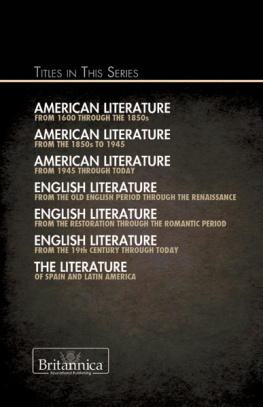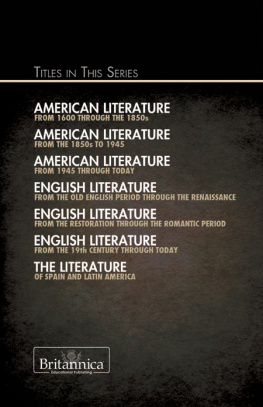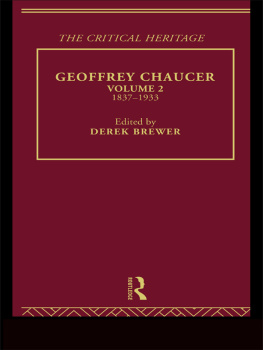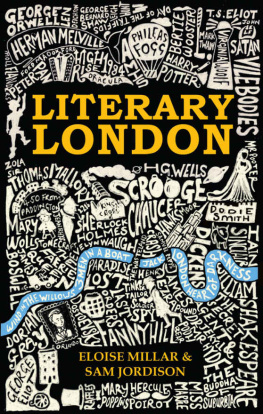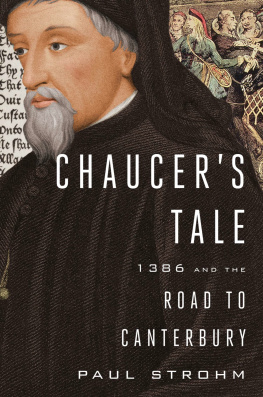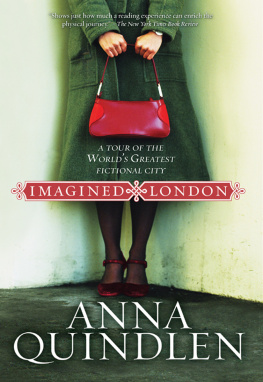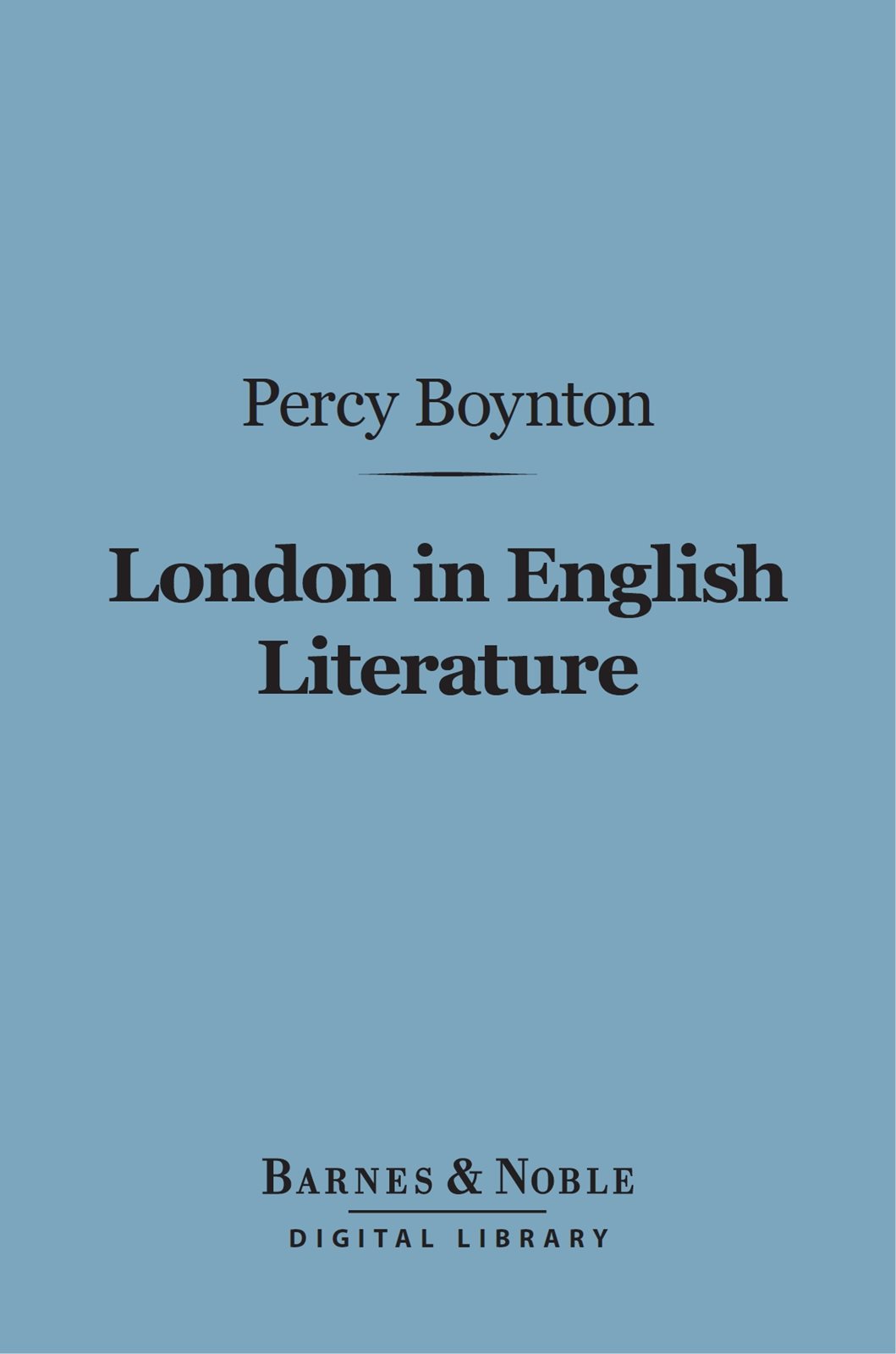LONDON IN ENGLISH LITERATURE
PERCY BOYNTON

This 2012 edition published by Barnes & Noble, Inc.
All rights reserved. No part of this publication may be reproduced, stored in a retrieval system, or transmitted, in any form or by any means, electronic, mechanical, photocopying, recording, or otherwise, without prior written permission from the publisher.
Barnes & Noble, Inc.
122 Fifth Avenue
New York, NY 10011
ISBN: 978-1-4114-5763-8
PREFACE
English literature embraces, as no one realizes better than I, a vast and complicated body of material. To make a part of this in some degree more intelligible is the purpose of the present volume. It is not addressed primarily to scholars. It has been written for students and readers who enjoy literature the better as they more clearly understand its original setting. Nothing is included in the volume which cannot be easily traced by reference to standard works on London and obvious sources in literature. It happens, however, that, in all the array of studies about the great city, none has been produced with the purposes of the present book: to give an idea of London atmosphere in the various literary periods, to expound the chief places of interest for successive generations, and to make a reasonably generous selection from old and new engravings and photographs. Those who care to follow up any of my findings may be aided by the footnotes, the lists of illustrative readings appended to the chapters, the appendix on illustrative novels, and the index, in which account is taken of these data as well as of the text. To one who pursues any of the devious paths blazed by these cumbrous tools, pleasant vistas will open out which lead far from the main highroad. And perhaps some student, thus beguiled, will one day complete on an ample scale a book for which the present volume hardly more than suggests a working method.
P. H. B.
CHICAGO
February 1913
CHAPTER I
CHAUCER'S LONDON
The history of such a city as London is invariably connected with the literature produced in it. Yet allusions with which literature is filled are not always clear to the average and to the casual reader, for the background against which poetry, drama, essays, and fiction have been written is a continually shifting one.
The chapters to follow are successively connected, for instance, with Chaucer's fourteenth century, with the sixteenth and seventeenth centuries as Shakespeare crossed the border line between them, with The Commonwealth and The Restoration as seen in Milton and Dryden, with two periods in the eighteenth century as witnessed by Addison and Goldsmith, with three in the nineteenth as seen by Lamb, Dickens, and George Eliot, and with the contemporary London of the twentieth century.
Here is a succession of periods each of which discovers London in a different spiritual stage, the whole tracing the community from the days of mediaevalism through the Renaissance, the vigorous reaction of Puritanism, the early rationalism of the eighteenth century, the rise of a new spirit of freedom and democracy, and the successive and vital changes of the last hundred years; and here, too, is a little procession of men every one of whom sees these changing phenomena not only from the point of view of his own generation but with the prejudices which belong to his own individual nature. Each chapter, therefore, involves a partial point of view and a transitory, evanescent London.
Yet the successive excursions are not quite aimless, for each one of them is directed to a series of visible places and buildings which are associated with picturesque episodes from the past. Moreover, although the same ground is frequently retraced, all have to do with an enlarging metropolis. Thus, the mediaeval walled town of Chaucer's day is succeeded in interest by the larger town of Shakespeare's, with its outlying theaters and its interesting highway to Westminster. Thus, the coffee-houses of Addison's time, the great business establishments of Lamb's, and the law courts and houses of Parliament of Dickens' day are all features of a growing city which in the end has become the vast and complicated London of the present, over a hundred times the area of the original little town with which we are to begin.
It was located in the most unpromising of sites:
Imagine a Mediterranean trireme herethe very end of the world, a sea the colour of lead, a sky the colour of smoke, a kind of ship as rigid as a concertinaand going up this river with stores, or orders, or what you like. Sandbanks, marshes, forests, savagesprecious little to eat fit for a civilized man, nothing but Thames water to drink. No Falernian wine here, no going ashore. Here and there a military camp lost in a wilderness, like a needle in a bundle of haycold, fog, tempests, disease, exile, and deathdeath skulking in the air, in the water, in the bush. They must have been dying like flies here..... Or think of a decent young citizen in a togaperhaps too much dice, you knowcoming out here in the train of some prefect, or tax-gatherer, or trader even, to mend his fortunes. Land in a swamp, march through the woods, and in some island post feel the savagery, the utter savagery, that had closed around himall that mysterious life of the wilderness that stirs in the forest, in the jungles, in the hearts of wild men.
The London of Chaucer's day was a full-fledged city with a long history behind it. For more than a thousand years before Chaucer's birth, on the spot where London now stands, the old city, or rather a succession of cities, had stoodan early British community, a Roman London, a deserted collection of moldering ruins, a Saxon London repeatedly occupied by the Danes, and a Norman London. From the time of the Conquest on, while the unity of the city as the metropolis of England was undisturbed, it may be said that physically three Londons have been erected, the dividing lines being the great fires of 1135 and of 1666. Both of these swept the heart of the old community and that part of the modern one which is technically known as "The City." Each was followed by a complete rebuilding which left many of the old thoroughfares, but completely transformed the look of the town. It was the second of these Londonsthe one existing during the half-millennium between the middle of the twelfth and the middle of the seventeenth centuriesin which Chaucer lived from 1340 to 1400.
This London was a little, unimposing town of which one can get a much better idea today by visiting such places as Canterbury or Oxford than by spending a casual week in the present enormous metropolis on the Thames. Its population was probably under 40,000. It extended about a mile along the north bank of the river and a half-mile back into the country; and even within these limits it was not solidly built up. It was completely surrounded by a wall, which on the land sides was supplemented by what had formerly been a wide and deep moat. The south portion, of course, lay directly on the riverfront. At the eastern end of this was the Tower, a royal and imposing castle, nobly preserved in its main features at the present time. From here the wall circled about to the northwest, punctuated by a succession of entrances, Aldgate, Bishopsgate, Moorgate, Cripplegate, and Aldersgate. At Smithfield (the old cattle market just outside the city, half a mile back from the Thames and rather more than that distance upstream from the Tower) the wall turned south by Newgate and Ludgate, past St. Paul's Cathedral to Blackfriars, the great Dominican monastery; and thus back to the river.





